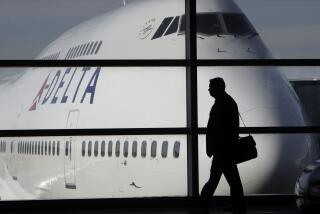Delta Claims Bias in American’s Booking System
- Share via
NEW YORK — Delta Air Lines accused American Airlines on Monday of building a bias into its computerized reservations system to the detriment of its competitors.
In a complaint filed with the Department of Transportation, Delta asked the department to investigate what it termed “American Airlines’ latest scheme to bias the display of its flights” in its Sabre computerized reservations system. Such systems, even though they are owned by individual airlines, are used by travel agents to sell tickets on virtually all carriers.
Delta, based in Atlanta, also asked the agency to assess “substantial” civil penalties against American.
Specifically, Delta says that American maintains two separate flight timetables in competitive markets, with each one showing a different “elapsed time”--the length of time between the departure and the arrival of a flight.
One of the American schedules, Delta charged, contains American’s “actual” elapsed time, although this schedule is not used in the Sabre system and is not disclosed to the public. The other schedule, Delta said, is used in the reservations system and “is held out to the public as being American’s flight times.”
The alleged difference is significant because the shorter a flight’s elapsed time, the greater prominence it earns on the computerized reservations system and the more likely it is to be chosen by the prospective passenger.
This is true because many travel agents reportedly sell from the first screen, if not the first line, of the reservation system’s computer display. And most people are said to accept the first flight--scheduled at the time they want to leave--that the agent reads to them.
American Denies Charges
“Although this second schedule is relied upon by consumers and travel agents in making reservations,” Delta’s complaint said, “Delta states that it is a sham schedule containing faster elapsed flight times in many markets than American intends to achieve in its day-to-day operations. American’s paper-only schedule biases Sabre in favor of American by taking advantage of the heavy emphasis on elapsed time used by Sabre in positioning of its flights.”
Lowell C. Duncan Jr., vice president for public relations of American, which is based in Dallas, said that American had “fully complied with both the spirit and the letter of the (computerized reservations system) regulations which we adopted in November of 1984. Therefore, we can only conclude that the complaint has no merit.” He specifically denied that American maintains two different schedules.
A spokesman for the Department of Transportation said that if the agency does find any violations, it could assess the offender $1,000 per violation. He said that the complaint had been received and that the department is awaiting a formal response from American.
Delta charged that the business that American “siphons off” from other carriers through its “latest Sabre bias scheme could be enormous.” It said--based on the example of a round-trip ticket worth $200--that “if American’s elapsed time scheme results in only one round-trip per month being diverted to American on each of the approximately 50,000 Sabre sets, the total annual amount (of) revenue loss to American’s competitors--and American’s annual revenue gain--would be $120 million.”
Sabre System Largest
Government rules adopted in 1984, after an investigation of competitive abuses in the computer reservations area, require that the systems be unbiased and that the computer terminals fairly display the flights of all participating airlines.
According to Airline Economics Inc., a Washington consulting firm, American’s Sabre system is the largest in the industry with 44,300 terminals in the offices of 10,600 travel agents. United Airlines’ Apollo system is next with 32,660 terminals used by 7,400 travel agents. Eastern Airlines, Trans World Airlines and Delta have smaller systems.
More to Read
Inside the business of entertainment
The Wide Shot brings you news, analysis and insights on everything from streaming wars to production — and what it all means for the future.
You may occasionally receive promotional content from the Los Angeles Times.










